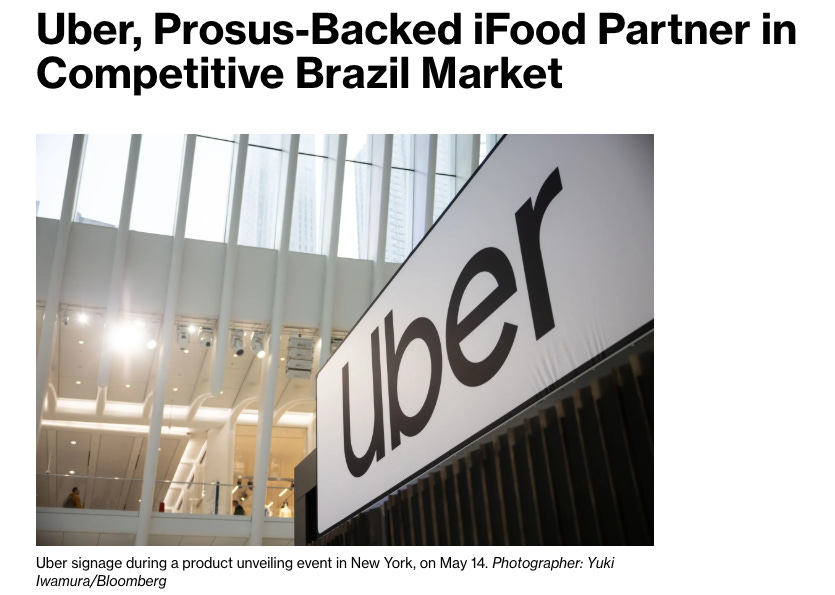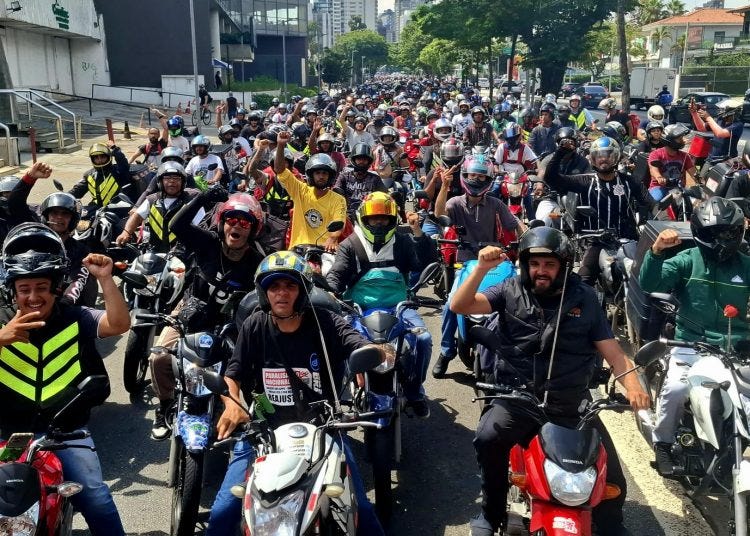China’s Food Delivery Giants Take on Brazil—Again
Meituan and Didi reignite a fierce battle in Latin America’s hottest delivery market
Brazil’s food delivery war is heating up. On May 15, Uber and local giant iFood unveiled a rare partnership—just as China’s Meituan and Didi prepare their comeback. This partnership allows Uber users to order food through iFood's platform, while iFood users can book Uber rides without switching apps. The cross-platform integration reflects both companies' push to expand their service offerings in Brazil's competitive digital market. According to Bloomberg, the collaboration between Uber and iFood is a strategic move to counter Chinese companies Didi and Meituan. Brazil has now become the latest battleground for Didi and Meituan's global expansion. Data from Euromonitor International shows that the food delivery market in Latin America has grown nearly fourfold over the past five years. Both Chinese companies and global players like Uber recognize the enormous potential of Brazil's food delivery market.
Didi's Global Expansion Based in Latin America
Didi is China's largest ride-hailing platform. In previous market competitions, Didi merged with Alibaba-backed competitor Kuaidi, acquired Uber China's operations, and completed cross-shareholding with Uber. Additionally, Didi is one of the few Chinese tech companies that Apple has invested in. In recent years, Didi has rapidly expanded in Latin America. In 2019, Didi launched its food delivery service, DiDi Food, in Mexico. Currently, Didi's food delivery service in Mexico covers more than 60 major cities, has partnered with over 70,000 merchants, and consistently delivers more than 300,000 orders daily, capturing over half of the market share. Beyond Mexico, DiDi Food has successively entered other Latin American countries including Colombia, Costa Rica, and Peru.
Didi's foothold in Latin America began precisely in Brazil, where they have just relaunched their food delivery business. In 2018, Didi acquired 99, Brazil's largest local ride-hailing service, and retained the 99 brand. This included the later launch of 99 Moto (Didi's motorcycle ride service) and the digital wallet 99 Pay. By 2020, Didi's share of Brazil's mobility market reached 50%. That same year, Didi launched the food delivery service 99 Food in Brazil. However, when 99 Food attempted to expand to more local food merchants, iFood demanded exclusivity from restaurants. At that time, both 99 Food and Uber Eats repeatedly tried to partner with major chains like McDonald's, but negotiations were blocked by iFood. After a year of effort, 99 Food held just 5% of the market—slightly behind Uber Eats at 10%. Eventually, Didi and Uber abandoned their food delivery businesses in 2022 and 2023.
Meanwhile, in Mexico, by partnering with local convenience store chain OXXO, users could top up their Didi balance with cash, enabling online payments. Didi's ride-hailing and food delivery businesses made significant progress in Mexico. Now, leveraging their experience from other Latin American countries and their local driver and user resources in Brazil, Didi is returning to Brazil's food delivery market. Didi currently has over 50 million active users in Brazil, with more than 1.5 million registered drivers on the platform, including 700,000 motorcycle riders. Since its launch in early 2022, the motorcycle ride-hailing service 99Moto has covered more than 3,300 towns in Brazil. The relaunched food delivery business will integrate with Didi's existing mobility network, allowing riders to simultaneously handle "transporting people, delivering goods, and delivering meals" tasks.

Meituan's Global Strategy
In a previous newsletter, I introduced Meituan as China's largest food delivery platform. Leveraging the high-frequency food delivery consumption scenario, they have made progress in multiple areas such as hotel bookings and movie ticketing in recent years. More importantly, their grocery delivery service has begun to threaten JD.com, an e-commerce site known for its logistics speed and service quality. As a defensive strategy, JD.com entered the food delivery sector, sparking a new round of competition among China's food delivery platforms.
In May 2023, Meituan officially entered the Hong Kong market using the KeeTa brand. In less than a year, KeeTa's market share surpassed foodpanda and Deliveroo, becoming the market leader in Hong Kong. This April, Deliveroo sold part of its assets to foodpanda and withdrew from the Hong Kong market. KeeTa brought Meituan's common strategies to Hong Kong. According to Chinese business media 36Kr, Meituan employed a "price war" strategy to enter the market, capturing food delivery market share through extensive discounts and subsidies. When entering Hong Kong, the company launched a HK$1 billion incentive program, offering new users HK$300 in vouchers for discounts and delivery fee waivers, with some promotions as generous as 60% off. Addressing the market pain point of high minimum order thresholds on food delivery platforms, KeeTa specifically established a "Solo Dining" section, offering all-inclusive food delivery packages (including meal and delivery fees), reducing the original order price from HK$160-180 to just HK$60. This strategy proved remarkably effective, reportedly doubling local food delivery order volume from the previous daily average of 150,000-200,000 orders to over 300,000 orders.
After establishing a firm foothold in Hong Kong in 2024, Meituan chose Saudi Arabia as its second overseas destination. Last September, KeeTa launched in Al Kharj and Riyadh in Saudi Arabia. Similar to its rapid market capture in Hong Kong, Keeta became the third-largest food delivery platform in the region after just four months. Meituan's expansion in the Middle East is also accelerating, with plans to cover 80% of Saudi Arabia by July 2025 and expand to other Middle Eastern countries and North Africa next year.
On May 12th, during Brazilian President Lula's visit to China, Meituan announced its entry into the Brazilian market. In fact, Meituan had internally determined that after Hong Kong and the Middle East, Brazil would be its next overseas destination. They not only recruited local employees but also relocated staff from Beijing and Hong Kong to Brazil.
Tony Qiu, the head of Meituan's KeeTa business, also transferred from Saudi Arabia to Brazil. Tony Qiu was once a key factor in Didi's development in Brazil. He previously worked at Morgan Stanley and Bain Capital before joining Didi in 2015, where he participated in the competition with Uber and the acquisition of Brazil's 99, serving as the Chief Operating Officer of Didi's international business unit. He later joined Kuaishou, TikTok's competitor, and launched Kwai in Brazil, which at one point shared the Brazilian market equally with TikTok. In 2022, Tony Qiu left Kuaishou and joined Meituan.
Labor Issues
In China, delivering food through Meituan and driving for Didi are considered last-resort income guarantees after unemployment. However, both in Hong Kong and Brazil, Meituan and Didi need to address issues with local delivery personnel. In recent days, KeeTa delivery workers in multiple areas of Hong Kong have gone on strike, protesting against the platform's reduction in per-order rates, implementation of priority dispatch mechanisms, and introduction of an order-grabbing system. Hong Kong local media Initium Media believes that Keeta continuously recruits personnel to maintain manpower, controlling workload and wages at any time, making it convenient to either attract or eliminate workers. The minority of "money-making" elite delivery workers are all full-time, highly efficient, and work long hours. The majority of delivery workers who cannot meet this standard are constantly pressured: either work harder, at lower prices, in less time, completing more tasks; or be abandoned by the company, receiving fewer orders, facing increasingly difficult tasks, and earning lower wages, creating a situation where delivery workers compete with each other in a race to the bottom.
In Brazil, the #BrequeDosApps strike action that began in 2020 continues to this day. Although delivery workers are currently primarily targeting the local giant iFood, Meituan and Didi's business expansion in Brazil will undoubtedly face similar situations.
Chinese tech giants aren’t just exporting business models—they’re reshaping labor markets, competing with global incumbents, and rewriting local platform rules.
Subscribe to follow the next battleground.







